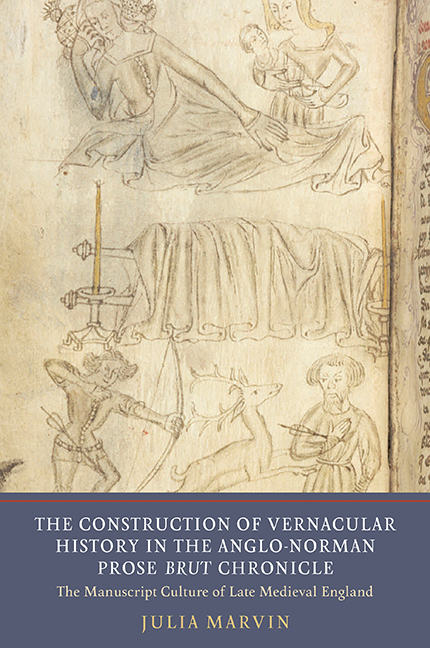 The Construction of Vernacular History in the Anglo-Norman Prose Brut Chronicle
The Construction of Vernacular History in the Anglo-Norman Prose Brut Chronicle Book contents
- Frontmatter
- Dedication
- Content
- List of Plates
- Acknowledgments
- Abbreviations
- A Note on Proper Names, Transcriptions, and Translations
- Introduction: Recognizing the Prose Brut Tradition
- Part I Construction
- 1 A New New Troy: Brut, Rome, and the Foundations of British History
- 2 The Community of the Realm: King, Baron, Brother, Stranger
- 3 Women with Voices
- 4 Social Arthur
- 5 The Continuity of the Realm
- Part II Reconstruction and Response
- Conclusion: Merlin's Power
- Bibliography
- General Index
- Index of Manuscripts Cited
3 - Women with Voices
from Part I - Construction
Published online by Cambridge University Press: 01 February 2018
- Frontmatter
- Dedication
- Content
- List of Plates
- Acknowledgments
- Abbreviations
- A Note on Proper Names, Transcriptions, and Translations
- Introduction: Recognizing the Prose Brut Tradition
- Part I Construction
- 1 A New New Troy: Brut, Rome, and the Foundations of British History
- 2 The Community of the Realm: King, Baron, Brother, Stranger
- 3 Women with Voices
- 4 Social Arthur
- 5 The Continuity of the Realm
- Part II Reconstruction and Response
- Conclusion: Merlin's Power
- Bibliography
- General Index
- Index of Manuscripts Cited
Summary
The Oldest Version of the Anglo-Norman prose Brut chronicle offers figures who tend to act according to recognizable types or conventions. Blustering tyrants, saintly bishops, and wicked pagan invaders take their turns. Just as the men do, the women of the chronicle appear in traditional, often overlapping, roles: mother and stepmother, saint and martyr, seductress, queen, servant, and victim of rape.Even female saints are portrayed primarily in relation to men – St Eleine is noted first as Constantine's mother, and then as the finder of the True Cross, and Ursula wins her martyr's crown in the defense of her virginity – but the socially determined and gendered nature of women's roles in the Oldest Version is nothing unusual. Social and familial relationship is the basis of individual identity in the chronicle. Men, too, appear in a set of socially determined roles, as good or bad kings and vassals, husbands, fathers, sons, holy men, servants, lovers, rapists, and assassins. But the women of the chronicle do not necessarily conform to stereotypical expectations of what their roles mean and what they demonstrate about women. The Oldest Version does not have much to say about gender or gender roles: what it manifests about them is all the more interesting and potentially significant for the fact that it is not explicit.
Mediators, Fighters, Mothers
The composer of the Oldest Version does not make the same effort to provide consistent morals to stories of feminine heroism or transgression as he does with, for example, would-be usurpers. He does not attempt to teach and reinforce lessons about proper womanhood as he does about kingship. Thus, although he may efface the regnant Queen Marcie to show his good kings to better effect, he does not hesitate early in the text, when her story has compelling lessons to offer, to portray a queen who does more than rule.
Locrin, Brut's eldest son, makes a good start to his reign by defeating the invader Humbar and his men, but he then falls into disastrous error:
Il troua en vne nef vne bele pucele, qe fu la fille le Roi Humbar et auoit anoun Estrild. Locrin quant il la vist, il fu taunt suppris del amour de li pur sa beaute qil la amenast ouesqe li a Noue Troie, e la voleit auer espuse.
- Type
- Chapter
- Information
- The Construction of Vernacular History in the Anglo-Norman Prose Brut ChronicleThe Manuscript Culture of Late Medieval England, pp. 73 - 92Publisher: Boydell & BrewerPrint publication year: 2017
